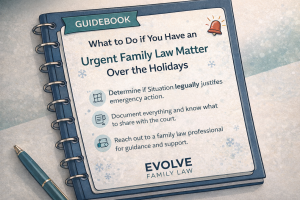
What to Do If You Have an Urgent Family Law Matter Over the Holidays
Family emergencies don’t pause for the holidays. If you’re dealing with an urgent family law issue over Christmas (like missed parenting time, safety concerns, or a breakdown in communication) it’s important to know what actually requires immediate legal action and what can wait. This post breaks down your options, what counts as “urgent,” and how to protect yourself and your kids during the holiday season.







